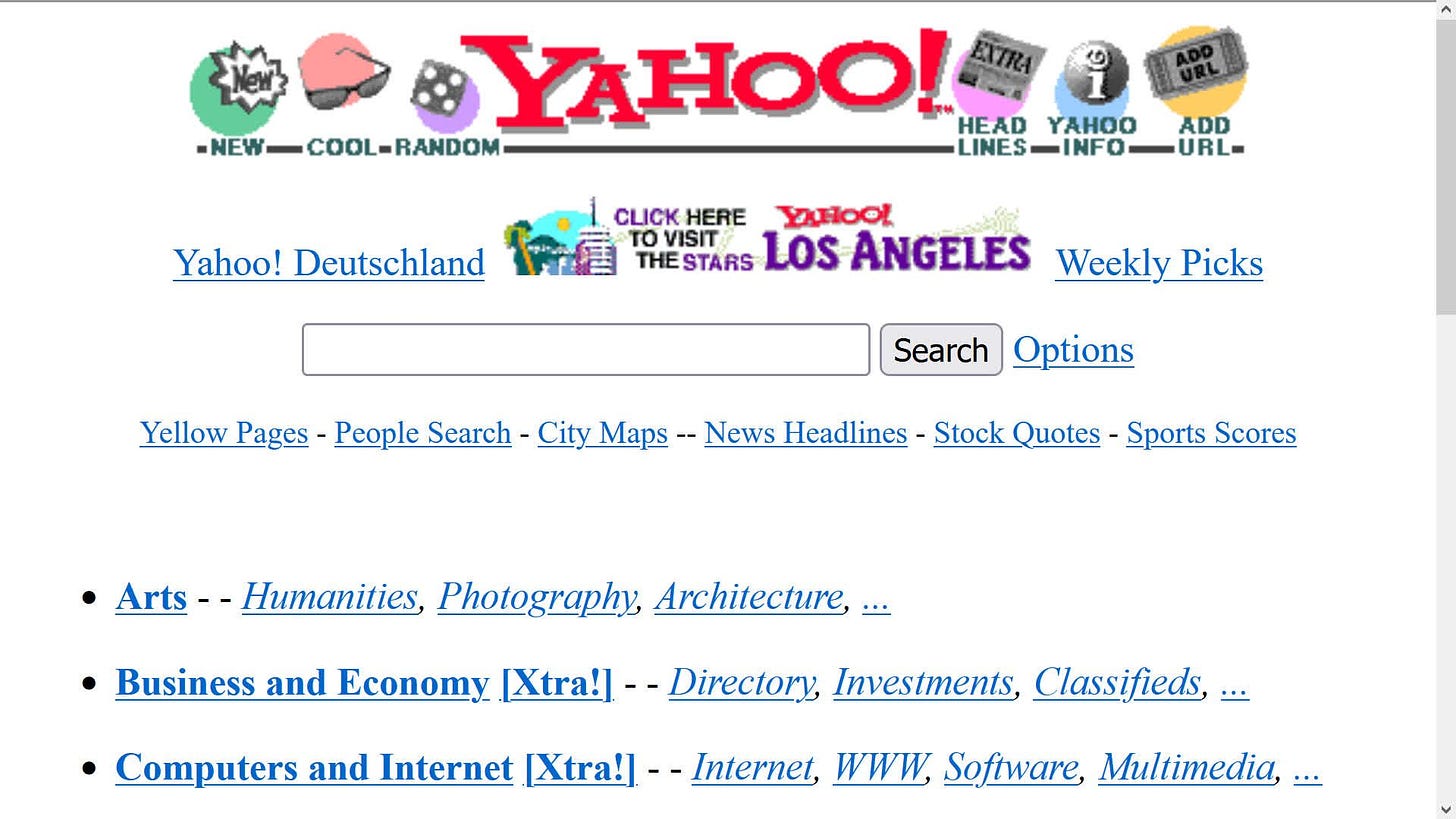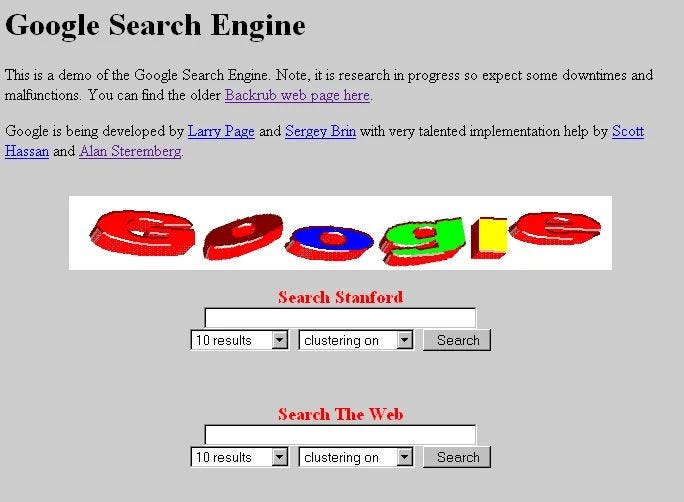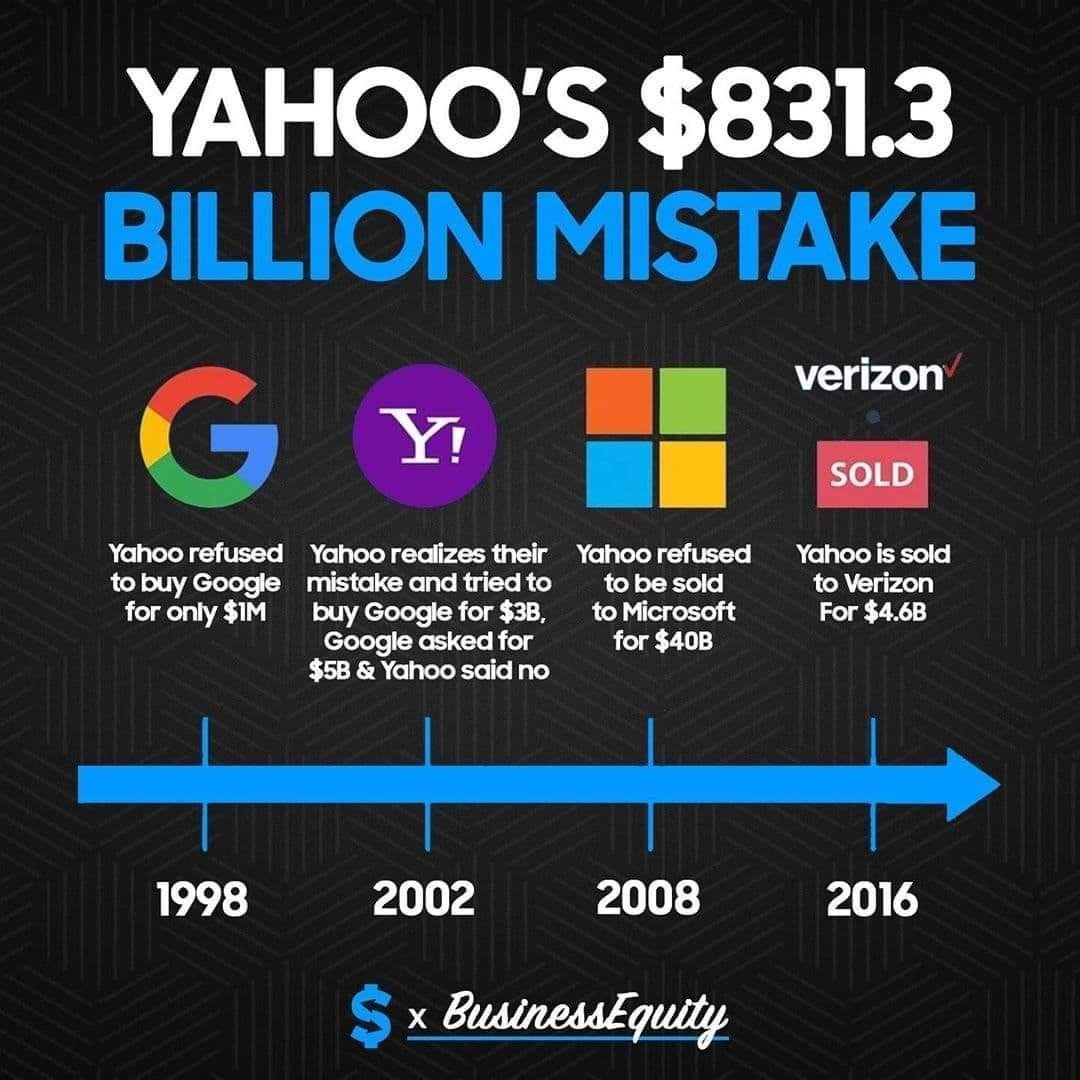The 1990s. The internet was young, chaotic, and full of potential. And in this fast-paced digital environment, Yahoo reigned supreme. Founded in 1994, it soon established itself as the go-to destination for anything online. Yahoo offered news, email, and chat rooms. If you were on the internet back then, you most likely used Yahoo.
But while this was happening, two Stanford kids working from a garage had a different idea about search, and Yahoo could never have predicted what was coming for them. This is the story of one of the biggest corporate wars in tech history: Yahoo vs Google.
1998: Manual Work vs PageRank
By 1997, Yahoo was untouchable and at its peak. Worth a staggering $125 billion, they held 90% of all internet searches. Thousands of employees powered their operations. Their offices buzzed with activity, as Yahoo’s empire worked to catalog the web like an enormous library. They had built a world where every internet search started—and stayed—with Yahoo.
But that empire had one major flaw: Yahoo’s search was curated by hand. An army of human editors organized websites, like librarians sorting index cards. As the web exploded, this system was struggling to keep up. They were drowning in new sites and information. This is where Larry Page and Sergey Brin - then doing their Ph.Ds at Stanford - saw the problem.
They set about creating something that would change the internet forever: PageRank. It was a powerful algorithm, a tool that could index and organize the entire web automatically—no humans, no manual updates, no million-dollar indexing teams required. They believed (and rightly so!) that PageRank was the future of search, and as you can imagine, Yahoo was in big trouble.
Yahoo decided to approach Google under the guise of “helping the fledgling startup.” Google, the underdog, welcomed them with open arms and a (cheeky!) price tag of $1 million a year to integrate this technology to power Yahoo’s search engine.
Yahoo’s response was dismissive, typical of someone that saw itself as invincible. They believed people came to Yahoo for the experience—the news, the chat rooms, the email, the full Yahoo world. To them, Google’s algorithm was a minor invention and not something that they would need to compete with. It didn’t fit into Yahoo’s vision of keeping users within their ecosystem, exploring Yahoo’s curated world.
Both parties walked away. And in that moment, tech history shifted forever.
Nothing Could Stop Google
Once Yahoo turned them down, Google took their idea to Yahoo’s biggest competitor: Netscape (co-founded by Marc Andreessen who also founded the popular venture capital firm a16z). The pitch was the same—$1 million per year for their breakthrough algorithm. But Netscape’s response was immediate and positive. They didn’t hesitate. Within six months, their traffic had tripled. With PageRank behind them, Netscape’s search was delivering faster, more relevant results, effortlessly outpacing Yahoo’s manual, labor-intensive indexing.
This was Google’s turning point. While Yahoo lounged in its $125 billion empire, confident in its dominance, Google was building a streamlined machine. PageRank was doing more than level the playing field. It was setting a new standard. No human editors, no delay. Just an extremely powerful algorithm delivering exactly what users needed.
By 2000, Google was processing over 100 million searches per day. And they weren’t just growing in user numbers; they were gaining credibility across the industry. Major tech publications began calling Google “the search engine that actually worked.” Their clean, simple homepage was a breath of fresh air, focusing purely on search without the extra frills.
Quietly, Google was transforming the game. And Yahoo? They were overly confident in themselves to notice the real shift happening beneath them. In brushing off Google’s potential, they had unknowingly fueled the rise of their own greatest threat.
2002: Rejected…Once Again
By 2002, Yahoo finally saw the gravity of the threat posed by Google to its leadership position. Google was no longer a scrappy startup—it was capturing the internet’s attention with its streamlined, accurate search. So Yahoo came knocking (again!), ready to make a serious move. They offered $3 billion to buy Google outright, hoping to bring its technology under Yahoo’s control once and for all.
But Larry Page and Sergey Brin had different ideas. Confident in what they’d built, they countered with a surprising offer: "Let us power your search engine instead." Yahoo could keep their ecosystem, their user base, and Google would just work behind the scenes, delivering the best search results.
Again, Yahoo felt triggered and responded with disdain. Why would they let Google run the core of their empire?
But Google didn’t back down. They gave Yahoo a taste of what their search technology could do, offering a trial period on Yahoo’s platform. And the results were amazing. Within a week, Yahoo’s user engagement doubled. People were spending more time on Yahoo, and they weren’t just browsing, they were actively searching and finding what they wanted.
But Yahoo still couldn’t see it. The deal was turned down, and Google went back to building and refining their tech.
Two Different Paths
In the years following that second rejection, the tech world saw two different paths unfold. Google was rising rapidly to the top, while Yahoo, once the undisputed leader, struggled to adapt.
The missed opportunity in 2002 set off a chain of events that transformed the industry forever. Google dominated search and digital advertising, while Yahoo struggled to keep up.
The Rise of Google
After 2002, Google’s influence grew unbelievably fast. With PageRank powering their search and users flocking to their platform, Google quickly became the number one website for finding information online. Their clean, simple homepage coupled with the power of their algorithm kept users coming back.
By 2004, Google had reached a critical milestone: they went public, launching their IPO at $85 per share. That initial offering? It brought in $1.67 billion which skyrocketed Google’s valuation to over $23 billion.
The IPO solidified Google’s position as a tech titan, and from there, the growth (and innovation) only continued. Google was transforming online search and it became a household name, you didn’t simple “search online,” you “Googled” it!
By 2005, Google commanded nearly 60% of the U.S. search market, and the gap between them and Yahoo was widening every year.
In the years that followed, Google continued to make strategic acquisitions—YouTube in 2006, DoubleClick in 2007—securing its dominant place in search and advertising. These acquisitions built Google into an internet powerhouse that extended beyond search into video, social, and beyond.
Yahoo’s Struggles to Keep Up
While Google kept winning, Yahoo kept losing.
Here’s some of their biggest mishaps and how they fell behind:
Clunky Search Investments:
Yahoo poured resources into building its own search engine, acquiring Inktomi and Overture to compete with Google. But their technology couldn’t match Google’s fast and precise algorithm.
Falling Behind in Digital Ads:
Google’s AdWords system revolutionized online advertising, drawing advertisers with its simplicity and effectiveness. Yahoo’s ad platforms, by contrast, struggled to compete, and Google quickly dominated the lucrative ad market.
Missed Acquisitions:
Facebook (2006): Yahoo offered $1 billion to buy Facebook. Mark Zuckerberg, Facebook’s CEO, rejected Yahoo’s offer. Rumor has it that if Yahoo had raised their bid to $1.1 billion, Facebook’s board might have pushed for the deal. But Yahoo refused to budge, and the opportunity slipped away. Today, Facebook’s market cap stands at over $900 billion.
Microsoft (2008): Microsoft proposed a $46 billion buyout of Yahoo, but the company declined, believing it was undervalued. Eight years later, Yahoo sold to Verizon for just $4.8 billion.
Netflix (2013): Yahoo passed on the chance to acquire Netflix for $4 billion, opting instead to buy Tumblr for $1.1 billion. While Netflix grew to a $140 billion market cap, Tumblr’s value plunged to $230 million. Yikes.
Yahoo kept repeating the same mistakes again and again, and kept underestimating emerging competitors, believing it could keep up with them. Each decision only continued to widen the gap between Yahoo and its competitors, quickly making the once well-known tech giant irrelevant.
What Can We Learn From Yahoo’s Epic Fail?
Keep reading with a 7-day free trial
Subscribe to The VC Corner to keep reading this post and get 7 days of free access to the full post archives.






